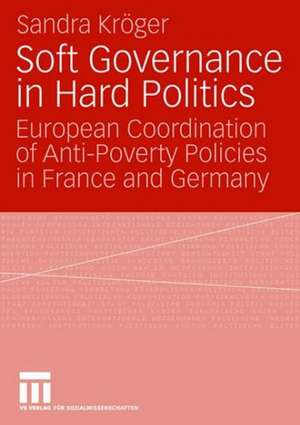Soft Governance in Hard Politics: European Coordination of Anti-Poverty Policies in France and Germany
Autor Sandra Krögeren Limba Engleză Paperback – 9 oct 2008
Preț: 376.02 lei
Nou
Puncte Express: 564
Preț estimativ în valută:
71.96€ • 74.75$ • 59.78£
71.96€ • 74.75$ • 59.78£
Carte tipărită la comandă
Livrare economică 03-17 februarie 25
Preluare comenzi: 021 569.72.76
Specificații
ISBN-13: 9783531163673
ISBN-10: 3531163671
Pagini: 253
Ilustrații: X, 246 p.
Dimensiuni: 148 x 210 x 23 mm
Greutate: 0.31 kg
Ediția:2009
Editura: VS Verlag für Sozialwissenschaften
Colecția VS Verlag für Sozialwissenschaften
Locul publicării:Wiesbaden, Germany
ISBN-10: 3531163671
Pagini: 253
Ilustrații: X, 246 p.
Dimensiuni: 148 x 210 x 23 mm
Greutate: 0.31 kg
Ediția:2009
Editura: VS Verlag für Sozialwissenschaften
Colecția VS Verlag für Sozialwissenschaften
Locul publicării:Wiesbaden, Germany
Public țintă
ResearchCuprins
Introducing the Lisbon Strategy and the OMC.- State of the art.- Research framework.- The OMC inclusion at national level.- The OMC inclusion at EU-level.- Evaluation of the OMC inclusion by involved actors.- Conclusion and outlook.
Notă biografică
Dr. Sandra Kröger is researcher and lecturer at the Jean Monnet Centre for European Studies (CEuS) of the University Bremen.
Textul de pe ultima copertă
TThe present study addresses the governance architecture of the much debated Open Method of Coordination (OMC) in the field of social inclusion and evaluates its implementation in France, Germany and at EU-level. Based on extensive variable-based empirical research, it assesses both the effectiveness and the legitimacy of the OMC and comes to unequivocal conclusions: Due to the resistance of member states and remaining differences in underlying ideas of social justice, anti-poverty policy could not be Europeanised through the OMC which unfolds as a very weak governance architecture. The general framework of negative integration remains unchallenged by this non-binding instrument which, to the contrary of its intention, rather forecloses the possibility of supranational learning. With regard to legitimacy, the OMC supports policy-making in closed, intransparent circles of very weakly or not democratically mandated representatives and therefore does little do decrease the democratic deficit of the EU - however one of its original ambitions.
Caracteristici
European coordination of anti-poverty policies in France and Germany












